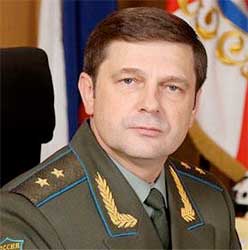
Space officials said the Proton's control engine failed 545 seconds (just over nine minutes) after its night-time blast-off from the Baikonur space centre Moscow leases in Kazakhstan.
State television showed the carrier and its Express-AM4P satellite burning up in the upper layers of the atmosphere above China.
"We have an emergency situation," Channel One television showed a Russian flight commentator as saying. "The flight is over."
Russia's Roscosmos federal space agency said it had formed a commission to analyse the telemetric data and discover the reasons for the emergency situation.
The €150m satellite - built by Airbus Group's Astrium corporation - was meant to provide Internet access to far-flung Russian regions with poor access to communication.
Astrium said on its website that the Express-AM4P was set to become the most powerful Russian telecommunications satellite ever built.
Roscosmos said it was grounding the Proton - a workhorse of Russia's space industry that earns tens of millions of dollars a year by launching Western and Asian satellites - during the investigation.
Russia sacked its previous Roscosmos chief in October 2013 after less than two years on the job because of a string of failed launches and other embarrassing incidents in the country's under-funded but historic space industry.
New Roscosmos Head Oleg Ostapenko has been tasked by President Vladimir Putin with overhauling the entire sector with billions of dollars in extra state funding.
The upgraded M version of the Proton has experienced a string of problems that have threatened Russia's reputation as a reliable but cost-effective alternative to US and European rockets.
The Proton-M was last grounded in July last year when it crashed back to Earth with three Russian-made Glonass navigation satellites.
The incident dealt a blow to the Kremlin because it has touted the Glonass as a superior alternative to the US Global Positioning System (GPS) that was unfurled years before the Russian project.
A previous space commission said that failure was caused by the improper installation of three of the Proton's six angular velocity sensors.
Russia also grounded the Proton in August 2011 after the malfunction of an upper booster that is additionally employed in the launch of military satellites.
Astrium said on its website that the lost satellite lost was due to replace another one that was built by the company but lost in the 2011 mishap.
Roscosmos said the Proton was scheduled to perform two more launches this year - one involving a new Glonass satellite and another to put up an "astrophysics craft" it failed to identify.
A space agency source told Interfax that the next mission scheduled for June 20 would now almost certainly be delayed.
"Launches resumed only three months after the last Proton accident," the unnamed industry source said.
Moscow fetes its rockets and still celebrates its ability to trump the United States during the Soviet-era space race by putting the first man in orbit in 1961. It is also a source of national pride that has featured prominently in Kremlin politics.
The recent chill in East-West relations set off by the crisis in Ukraine prompted Russia to warn that it may prohibit the United States from using one of its newest rockets in the launch of its military satellites.
Moscow also hinted that it may turn down Washington's request to extend the lifespan of the International Space Station - a project that relies on the Soyuz system for manned launches - by four years until 2024.
Source: AFP via I-Net Bridge

For more than two decades, I-Net Bridge has been one of South Africa’s preferred electronic providers of innovative solutions, data of the highest calibre, reliable platforms and excellent supporting systems. Our products include workstations, web applications and data feeds packaged with in-depth news and powerful analytical tools empowering clients to make meaningful decisions.
We pride ourselves on our wide variety of in-house skills, encompassing multiple platforms and applications. These skills enable us to not only function as a first class facility, but also design, implement and support all our client needs at a level that confirms I-Net Bridge a leader in its field.
Go to: http://www.inet.co.za